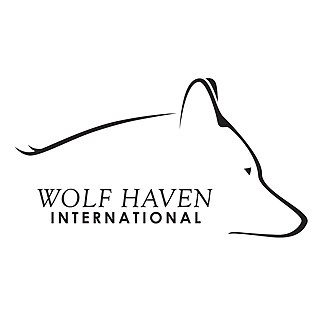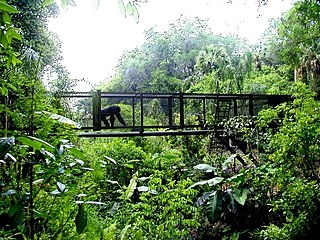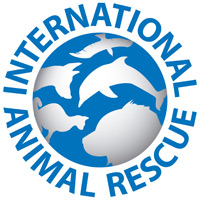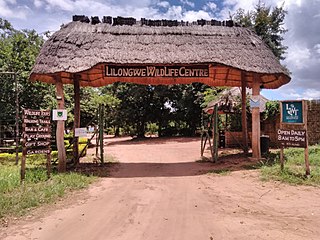The Born Free Foundation is an international wildlife charity that campaigns to "Keep Wildlife in the Wild". It protects wild animals in their natural habitat, campaigns against the keeping of wild animals in captivity and rescues wild animals in need. It also promotes compassionate conservation, which takes into account the welfare of individual animals in conservation initiatives. Born Free also creates and provides educational materials and activities that reflect the charity's values.

Wolf Haven International, previously known as Wolf Country and Wolf Haven America, is a wolf sanctuary and 501(c)(3) non-profit organization headquartered in Tenino, Washington. Founded in 1982 by Steve and Linda Kuntz, the organization provides educational programs on wolves, engages in wolf-related activism, and operates as a sanctuary for displaced, captive-born wolves. It also fosters and participates in captive-breeding programs for two highly endangered types of wolves: the red wolf and the Mexican wolf. Wolf Haven is one of three facilities in the United States that provides pre-release housing for Mexican gray wolves bred for Southwest restoration programs.

An animal sanctuary is a facility where animals are brought to live and to be protected for the rest of their lives. Pattrice Jones, co-founder of VINE Sanctuary defines an animal sanctuary as "a safe-enough place or relationship within the continuing hazards that menace everybody". In addition, sanctuaries are an experimental staging ground for transformative human–animal relations. There are five types of animal sanctuaries reflective of the species-belonging of the residents: 1) companion animal sanctuaries; 2) wildlife sanctuaries; 3) exotic animal sanctuaries; 4) farmed animal sanctuaries; and 5) cetacean sanctuaries.

Wildlife rehabilitation is the process of caring for injured, sick, orphaned, or displaced wild animals with the goal of releasing them back into their natural habitat. It involves medical treatment, temporary housing, and specialized care for a variety of species, from birds and mammals to reptiles and amphibians. Wildlife rehabilitation combines veterinary science, wildlife conservation, and animal welfare to ensure that animals have the best chance for recovery and survival after facing challenges such as injury, disease, or human interference.

Ngamba Island Chimpanzee Sanctuary, is an island sanctuary in Uganda, dedicated to the care of orphaned eastern chimpanzees, that have been rescued by the Uganda Wildlife Authority. Many of the chimpanzees were rescued from poachers and are unlikely to survive reintroduction to the wild. The Sanctuary is acredited by the Global Federation of Animal Sanctuaries.

Carolina Tiger Rescue is a nonprofit wildcat sanctuary in Pittsboro, North Carolina, that offers public tours and field trips and is home to rescued tigers, lions, cougars, leopards, caracals, servals, bobcats and other wild animals. Over 20,000 visitors come to the sanctuary each year for guided tours, field trips, summer camps, volunteering and corporate work groups. Their mission is saving and protecting wild cats in captivity and in the wild. They work toward a day when wild cats are living in their native habitat and are not exploited by humans. Carolina Tiger Rescue is Global Federation of Animal Sanctuaries (GFAS) and USDA accredited. The Executive Director is Kris Marino.
Save the Chimps, Inc is a 501(c)(3) nonprofit American sanctuary specializing in the care of chimpanzees. The organization was founded by Carole C. Noon in 1997 with support from Jon Stryker of the Arcus Foundation. Save the Chimps is accredited by the Global Federation of Animal Sanctuaries (GFAS) and a founding member of the North American Primate Sanctuary Alliance. The mission of Save the Chimps is to provide sanctuary and exemplary care to chimpanzees in need. Since opening, the sanctuary has saved over 300 chimpanzees.
The Fauna Foundation is the only accredited chimpanzee sanctuary in Canada. Located just outside Chambly, on the South Shore of Montreal, the story of Fauna started in 1990 by Gloria Grow and Dr. Richard Allan on their 150-acre (0.61 km2) farm. Later in 1997, it became the Fauna Foundation. Its primary objective, the rescue and care of chimpanzees who have been used in research, began in the wake of the shutdown of LEMSIP.
The Captive Primate Safety Act is proposed United States legislation that modifies the Lacey Act Amendments of 1981 to treat nonhuman primates as prohibited wildlife species, allowing exemptions for zoos and research facilities. The bill would eliminate the use of primates in the domestic pet trade at a federal level. A December 2023 review found that the "U.S. ranked third out of 171 countries in the ease of purchasing a pet primate online, behind Indonesia and Vietnam." The bill, if passed, would raise U.S. standards to resemble those of the European Union, United Kingdom, Italy, the Netherlands, and other countries where pet primates are strictly regulated.

The Center for Great Apes is an animal sanctuary for great apes located east of Wauchula, Florida. Founded as a nonprofit organization in 1993, the sanctuary has about 70 orangutans and chimpanzees who were formerly used in entertainment, scientific research, or the exotic pet trade. The sanctuary sits on 100 acres of land in rural Florida, southwest of Orlando.

International Animal Rescue (IAR) is a British wildlife protection and conservation non-profit organization. IAR aims to protect and mitigate the threats to wildlife and habitats.

Big Cat Rescue Corp., also known as BCR and previously known as Wildlife on Easy Street, Inc., operates an animal sanctuary in Hillsborough County, Florida, United States, which rescues and houses exotic cats, and rehabilitates injured or orphaned native wild cats. It was founded by Don Lewis and Carole Baskin in 1995.
Rise for Animals is a national, registered 501(c)(3) nonprofit animal rights organization which aims to end nonhuman animal experimentation. It has been described as "one of the oldest and wealthiest anti-vivisection organizations in the United States".

The Lilongwe Wildlife Centre is a wildlife sanctuary in Lilongwe, Malawi, which is part of Lilongwe National Park. It was founded in 2007 by the Lilongwe Wildlife Trust (LWT) and the Born Free Foundation. The Centre is a member of the Pan African Sanctuary Alliance (PASA) and the Global Federation of Animal Sanctuaries (GFAS). It is known for its animal rescue work.
The American Sanctuary Association (ASA) was a 501(c)(3) nonprofit organization founded in 1998 to set standards for animal care and housing. The goal of ASA was to link sanctuary directors and founders in order to share experiences and to enable unwanted and wild unreleasable animals to find safe haven. The ASA was headquartered in Las Vegas, Nevada, United States.

The Zoological Association of America (ZAA) is a non-profit organization founded in 2005. It is dedicated to responsible wildlife management, conservation, and education. ZAA is headquartered in Punta Gorda, Florida. It officially accredits zoos and aquariums in both the United States and Canada.

Project Chimps is a privately funded 501(c)(3) nonprofit animal sanctuary for chimpanzees formerly used in research. It will eventually house 200 chimpanzees on an over 230 acre property in the Blue Ridge Mountains in Morganton, Georgia. Project Chimps is accredited by the Global Federation of Animal Sanctuaries.
Chimp Crazy is an American documentary series directed and produced by Eric Goode. It follows Tonia Haddix, whose love for a chimpanzee spins into a wild game with authorities and the animal rights group PETA.











